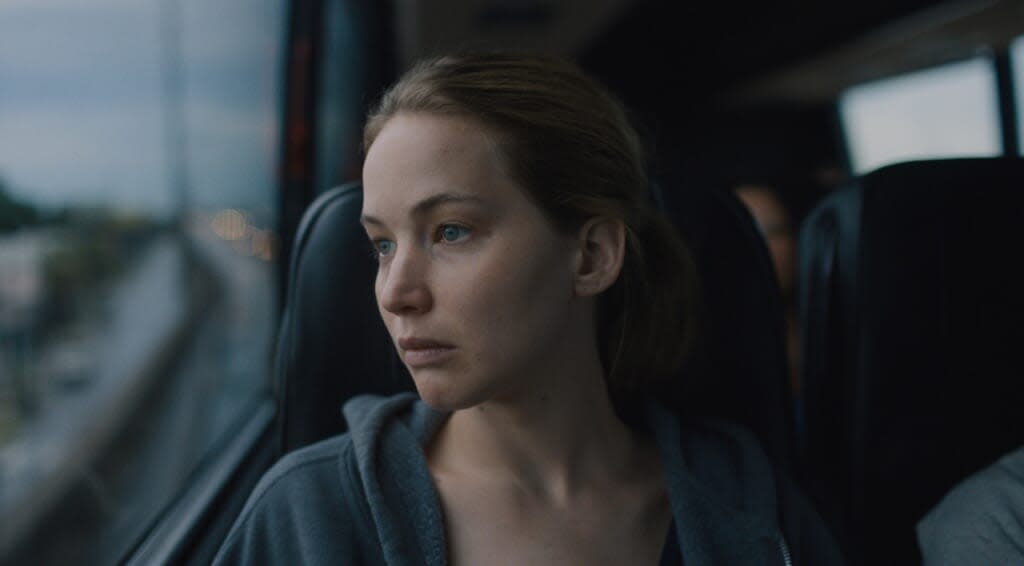‘Causeway’ Review: A Subdued Jennifer Lawrence Shines in Intimate Drama

- Oops!Something went wrong.Please try again later.
- Oops!Something went wrong.Please try again later.
This review originally ran on September 10, 2022, in conjunction with the film’s world premiere at the Toronto International Film Festival.
Jennifer Lawrence’s movie stardom sometimes makes it hard to remember just how down-to-earth and gritty an actress she seemed to be when audiences first became aware of her in 2010’s “Winter’s Bone” — or even, before that, in 2008’s “The Burning Plain.” Those films were raw, artful indies and Lawrence’s charisma didn’t obscure the fact that even as a teenager, she was a tough, resourceful actress whose performances were grounded, not glamorous.
A decade and a lot of awards later, Lawrence comes as something of a shock when she appears onscreen, morose and barely verbal, in first-time feature director Lila Neugebauer’s “Causeway.” The drama, which premiered on Saturday at the Toronto International Film Festival, doesn’t provide an “oh yeah, she’s a really good actress” moment, because she’s been doing fine work all along – but it is a reminder that a subdued, understated Lawrence can be a truly compelling Lawrence. (Maybe even the most compelling Lawrence since “Silver Linings Playbook” a decade ago.)
But “Causeway” isn’t a one-woman show. Lawrence’s co-star, Brian Tyree Henry (best known for his roles on the TV shows “Atlanta,” “Boardwalk Empire” and “This Is Us”) is as subtle and grounded as she is, with the two of them crafting quietly memorable chemistry as battered souls taking different roads to some kind of redemption. This is not any kind of standard love story, but a portrait of an unlikely friendship that feels achingly real.
Also Read:
‘I’m Totally Fine’ Review: Indie Sci-Fi Comedy’s Actually a Stealth Tearjerker
Neugebauer is best known as a theater director, though she has directed episodes of “Maid” and “The Sex Lives of College Girls.” But here, working from a script by Luke Goebel, Ottessa Moshfegh and Elizabeth Sanders, she displays no sign of a neophyte’s nerves, sliding into feature films with a calm assurance.
Lawrence plays Lynsey, a veteran of the war in Afghanistan who is emerging from extensive physical and mental therapy. She has panic attacks at night and has trouble filtering her thoughts when she does decide to speak: “What a miserable life,” she blurts out when her caretaker talks about her daily routine. But rather than doing much in the way of introspection, she’d rather gobble what she calls her “don’t shoot yourself in the head” pills as she begs her doctor (Stephen McKinley Henderson, flawlessly underplaying once again) to let her re-deploy.
Because she needs to go somewhere to recuperate, Lynsey heads to her mother’s house in New Orleans, where mom has a boyfriend, uncertain hours and a taste for booze that her daughter doesn’t share. Not suited to sitting at home, Lindsay gets a job cleaning pools, then befriends James (Henry), the owner of a car repair joint and a man whose marriage ended badly some years earlier.
Their friendship grows slowly and moves with easy Crescent City rhythms. Cinematographer Diego Garcia, whose resume ranges from Paul Dano’s exquisite “Wildlife” to Apichatpong Weerasethakul’s wildly different (and equally exquisite) “Cemetery of Splendour,” helps illuminate the places that make that town so special, from corner joints to mansions whose pools are often as not grand monuments to an elegance and affluence that has faded. “Causeway” feels like New Orleans, adopting the pace and energy of a deeply funky town that has almost (but not quite, dammit!) been battered into submission.
Also Read:
‘Bardo’ Review: Iñárritu Uses History, Humor and Surrealism to Dissect Mexico, and Himself
Lynsey is drained, and the film takes on her energy, too; nothing is rushed, nothing is overstated, and the presence of a big star in a movie that refuses to be big isn’t an oddity but a real pleasure.
Both of the main characters get lengthy, quietly riveting monologues: Lynsey when she describes the attack that left her injured to her neurologist, James when he tells Lynsey of the auto accident that killed his young nephew.
But for the most part, the conversations play out casually, with Lawrence and Henry never breaking a sweat (except the kind that everybody in New Orleans has) but never being less than wholly convincing. Key moments are tossed off: Hanging out in a swimming pool whose owners are out of town, Lynsey tells James that she used to see how long she could hold her breath. “What’s the longest you ever went?” he asks.
“Twenty-six years,” she answers with a shrug.
Long stretches go by in silence; a few New Orleans classics (mostly obscure classics) come on the radio, but when composer Alex Somers’ music arrives it’s often as not slow washes of sound, echoey and evocative chords that hang in the air.
For a little more than 90 minutes, stuff happens, mistakes are made, life goes on. And with a lovely intimacy and just enough rueful humor, Neugebauer, Lawrence and Henry deliver an unhurried gem that might feel slight but always feels right.
“Causeway” opens in select US theaters Oct. 28 and on Apple TV+ Nov. 4.

